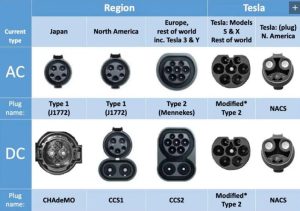As the electric vehicle (EV) market expands rapidly, selecting the appropriate charging connector type is a critical decision for EV owners. Different charging connectors vary significantly in performance, compatibility, and application.
1. Guide to Selecting Different Types of EV Charging Connectors
Choosing the right EV charging connector involves several factors, including geographic location, vehicle compatibility, charging speed requirements, and usage scenarios.
1.1 Selecting the Right Standard Based on Location
North America and Japan: If your vehicle is used in North America or Japan, Cineál 1 (SAE J1772) and CHAdeMO are common choices. Cineál 1 is suitable for slow AC charging, while CHAdeMO is used for fast DC charging.
Europe: In Europe, Cineál 2 (Mennekes) and CCS2 (Combined Charging System 2) are predominant. Cineál 2 supports both singlephase and threephase AC charging, making it suitable for most public and home charging scenarios. CCS2 is ideal for fast charging needs.
tSín: The Chinese market primarily uses the GB/T standard, which includes GB/T 20234.2 for AC charging and GB/T 20234.3 for DC fast charging.
1.2 Consider Vehicle Charging Port Compatibility
Compatibility Check: Ensure the selected charging connector is compatible with your vehicle’s charging port. Most EVs list the supported charging standards in the user manual.
Specific Brands: Some brands, like Tesla, use specific connectors in different markets. In North America, Tesla uses its proprietary connector, while in Europe, it adopts the standard Type 2 connector.
1.3 Evaluate Charging Speed Requirements
Home and Office Charging: If charging primarily overnight at home or at the office, Cineál 1 or Type 2 AC chargers are usually sufficient. These provide slow charging that can fully charge the battery over several hours.
Fast Charging Needs: For quick energy replenishment in a short time, CCS or CHAdeMO DC fast chargers are ideal, capable of charging an EV up to 80% in just 30 minutes.
1.4 Consider Future Charging Needs
Higher Power Compatibility: Choosing a connector that supports higher power can provide future compatibility for potential battery upgrades or higherpower charging equipment. For example, selecting CCS2 ensures support even if you upgrade to a new car or need higher power fast charging in the future.
1.5 Usage Scenario and Convenience
Home Charging: For home charging, consider installing a connector that matches the local grid, like Type 1 or Type 2, along with a compatible charging station.
Public Charging: For public charging stations, choosing a vehicle that supports popular fast charging standards (like CCS or CHAdeMO) ensures easier access to compatible charging stations.

2. InDepth Look at Various EV Connector Types
2.1 Type 1 (SAE J1772)
Connector Details: Cineál 1 is a fivepin singlephase AC charging plug widely used in North America and Japan.
Power Capacity: It supports a maximum charging power of 7.4 kW, suitable for home charging and lowpower public charging.
Application: Commonly used in home and public charging stations in North America and Japan, ideal for overnight slow charging.
2.2 Type 2 (IEC 62196 / Mennekes)
Connector Details: Cineál 2 is a sevenpin plug that supports both singlephase and threephase AC charging, the standard in Europe.
Power Capacity: It supports up to 22 kW (singlephase) or 43 kW (threephase) charging, meeting highpower charging needs.
Application: Widely used in European home charging stations and public charging points, suitable for faster charging scenarios.
2.3 CCS (Combined Charging System)
Connector Details: CCS combines the AC charging functionality of Type 1 or Type 2 with DC fast charging capabilities. CCS1 is used in North America, and CCS2 in Europe.
Power Capacity: Supports up to 350 kW of DC fast charging, providing substantial power in a short time.
Application: Ideal for public fast charging stations, catering to the need for quick charging during longdistance travel.
2.4 CHAdeMO
Connector Details: CHAdeMO is a Japanesedeveloped DC fast charging standard, supporting up to 65 kW of charging power.
Application: Commonly used by Nissan and other Asian brands, suitable for fast charging in public stations, particularly in Japan and some North American areas.
2.5 GB/T
Connector Details: GB/T is China’s EV charging standard, including GB/T 20234.2 for AC charging and GB/T 20234.3 for DC fast charging.
Application: Extensively used in the Chinese market, supporting a range from slow AC charging to highspeed DC fast charging.
Compatibility: Suitable for both home and public charging facilities in China.
2.6 Tesla Connector
Connector Details: Tesla uses a proprietary connector in the North American market, compatible with its Supercharger network. In Europe, Tesla vehicles use the standard Type 2 connector.
Power Capacity: Supports up to 250 kW of Supercharging, designed exclusively for Tesla vehicles.
Application: Provides a fast and convenient charging experience at Tesla’s dedicated Supercharger stations and for home charging.
When choosing an EV charging connector type, understanding the characteristics and application scenarios of each connector is crucial. Whether for daily home slow charging or for quickly topping up energy on the road, selecting the right connector enhances charging efficiency and ensures compatibility and convenience.


